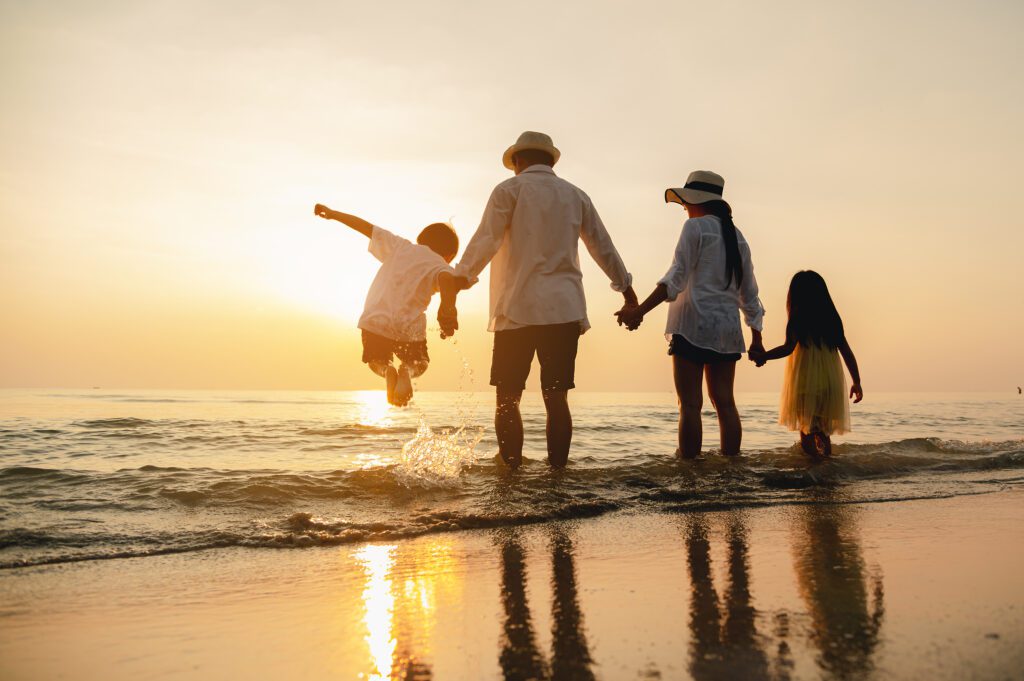Deciding what to pack for a family beach vacation trip can be hard.
To lend a helping hand, we’ve compiled our top packing tips alongside a handy checklist for family trips to the beach.
Packing Tips for Your Beach Vacation

There are plenty of essentials that you should consider when deciding what to pack for family beach vacations, but one thing you can’t get around is the storage limit.
Traveling with children on a plane is quite different from driving cross-country in a camper van, and for that reason, it’s usually important to focus on storing things as efficiently as possible.
Try to pack everything you need several days before your trip, rather than at the last minute. This gives you enough time to sort and rearrange things. You can pack any daily necessities at the last minute, but try to minimise the number of those you’re dealing with.
Seeing as you’re looking to escape on a sunny beach vacation, be sure to take a look at our “Can I bring Sunscreen on a plane?” guide, especially if you’re traveling by airplane
A Checklist For Your Family Beach Vacation
| Baby powder/cornstarch | Eyeglass case (if needed) | Razor |
| Beach bag | First aid kit | Sand mat |
| Beach tent | Haircare products | Shampoo and conditioner |
| Books | Hand sanitizer | Shaving cream |
| Brush & comb | Health insurance | Snorkeling gear |
| Cash | Hotel/Car/Flight information (printed) | Suitcase |
| Clothes (3 pairs/person, minimum) | Immunization records | Suitcase lock |
| Cooler bag | Insect repellent | Sunglasses |
| Credit cards | Life jacket (one per person) | Sunscreen |
| Deodorant | Makeup | Swimming goggles |
| Disinfecting wipes | Medicines (including vitamins) | Toiletry bag |
| Driver’s license | Mesh bag | Toothbrush & toothpaste |
| Ear infection drops | Ocean book | Travel insurance |
| Earplugs | Passports | Umbrella |
| Eyemask | Plastic utensils | Water bottle |
Clothing & Essentials
Clothing is one of the bulkiest items to pack and try to bring at least three sets for everyone. This gives you enough time to enjoy your beach trip without the hassle of cleaning clothes every single day but without the space requirements necessary to have a fresh pair of clothes every day.
This category includes swimwear, but you can usually cut it down to two sets for each person. Most swimwear doesn’t need washing after every use, although some people may prefer that. Don’t forget flip-flops or sandals, rain jackets in some areas, and extra underwear as necessary.
The thing to pack right after the clothing is your medicine. We do clothing first so you can get it all in and squish it as necessary, but medicine is usually even more important. Try to have the supply for every day of your trip, and make sure to label it or follow airline storage guidelines as needed.
After medicine comes toiletries, although most of these are a little less important. If you’re tight on space, you can leave them at home and buy them on-site, discarding any extra before you return. That’s more expensive than bringing your own, but when space is limited, it can be practical.
Try to bring regular toothbrushes instead of electric ones. Electrical options often have batteries, and those could cause problems during air travel. This is, obviously, less of a concern if you’re driving.
Don’t forget about life jackets if anyone’s going to go into the water. You can bring your favorite ones from home or get them on-site, but these are essential for proper beach safety. They may not look as nice as just your swimsuit, but they save lives. Don’t go to the beach without these.
No trip is complete without cash. Whether you want to buy snacks at the beach or need to hire an emergency cap if someone declines your card, cash is always helpful, and you can hide it in clothes, bags, or even some compartmented belts. Make sure you have the local currency if you’re traveling internationally.
Credit cards are also handy. Try to bring these instead of debit cards because they often have additional purchase protection if there’s a problem on your trip. If needed, you can use a credit card to withdraw extra cash during your trip. Remember that you may need to check with your insurance before filing a claim with a credit card company.
Finally, make sure you have all of your papers. That includes at least one driver’s license, health and travel insurance, a passport if necessary, and other identifying documents that can help in case an emergency occurs.
Make sure you also bring printed copies of your hotel, car rental, and flight information. This can help you if you lose access to your electronics. You don’t want to miss a flight home, so hard copies with barcodes and other useful information can end up saving you a lot of money.
Beach Gear
Beach gear includes a vast selection of items, some of which are near-mandatory and others that are merely helpful.
The first thing to look for is a sand mat, which you may find under similar names like “beach mat”. What we’re looking for here is, specifically, a mat with holes in it that will allow sand to fall through but not rise back up. These help provide a comfortable area to sit and put your things.
A beach tent is also helpful. These are usually smaller and lighter than sleeping tents because they’re meant for sitting in rather than snoozing. The main reason they’re useful is that they can provide outstanding protection from the sun for extended periods. These are particularly useful if you have small children to worry about.
Umbrellas are popular alternatives to beach tents, but these can be hard to bring on an airline. There’s a good chance you’ll need to rent one at your destination. Check local beach shops or your hotel.
A beach bag is a good way to store your things. Most of these aren’t wholly waterproof, but yours should be at least water-resistant and help keep sand out. For added protection, put everything sensitive into plastic bags with zipper-lock seals. This will help if you get splashed unexpectedly.
Sunglasses and regular glasses cases are also handy. Like umbrellas, it may be easier to get these at your destination. The main reason to get them is that beaches can have a lot of reflections. Cutting those down is important for protecting your eyesight.
A cooler bag is a great way to store your beach gear. Sadly, it’s hard to bring an entire cooler on an airplane, so you may need to leave that at home. Foldable cooler bags are the best alternative and can help keep food and drinks cold while you’re at the beach. This works especially well if you add an ice pack and put it in your beach tent.
A lighter mesh bag is useful for carrying dirty clothes and sandy beach gear once you’re done with this. Remember that a mesh bag is different and separate from your beach bag. Try to have a mesh that’s tight enough to keep water and sand in, though, or you could end up covering all of your other stuff with that.
Medicines & Sun Care
We touched on this earlier, but medicine deserves an expanded mention here. Medicine broadly falls into two categories when deciding what to pack for family beach vacations: essential and useful.
- NOTE: The TSA have strict guideline on what can and cannot be packed if traveling by airplan. Take a look at their What Can I Bring guide.
Essential medicine includes any prescriptions you have, preferably in solid form. Airlines can get testy about liquid medicines, even if they have labels, so taking pills is usually better when possible.
Optional medicines and sun care include things that may be helpful but aren’t necessary. This includes sunscreen, insect repellent, a first aid kit, and a few painkillers just in case. Ear infection drops are also handy since those are common in kids, and you should have some waterproof bandaids to ensure they stay on during the rest of the trip.
Disinfecting wipes technically fall into this category, although you could make an argument that they’re regular beach gear instead. Even ignoring the Covid-19 pandemic, visits to the beach can expose you and your things to a variety of sea-borne pathogens. Disinfecting wipes help limit your exposure there.
Hand sanitizer fulfills essentially the same role as disinfecting wipes. If you can only fit one, bring the wipes because it’s easier to use those on objects.
Baby powder or cornstarch is surprisingly useful for beach trips. This is mainly because they’re excellent at getting rid of sand, which is coarse and often gets everywhere. The right powders cost almost nothing and can take sand right off, leaving everyone feeling fresh again.
If space permits, make sure you include a full first aid kit somewhere. These can be impressively compact, and plenty of websites have guides and reviews for picking a kit. We’re not recommending any specific kit (or seller) today but look for ones that are waterproof and not too bulky.
Finally, see if you can get an emergency healthcare guide. Your first aid kit may have one, but beach vacations are a good time to teach kids about CPR techniques and other emergency care. Hopefully, you’ll never need those skills, but it’s good to teach them before the trip.
Fun & Play
No trip is complete without some things for fun. Smartphones and tablets are always popular, but have limited battery life and may be hard to use on a sunny beach. Besides, it’s a vacation. Checking messages in the morning is one thing, but do you want to have everyone in your family staring at electronics all day?
Try to pack at least a few books that people will enjoy. Books don’t require batteries, so they’re a reliable choice for entertainment in almost any circumstances. Unfortunately, they are kind of bulky, so be careful and limit yourself here even if you love reading. Magazines are an acceptable substitute for books, but usually not as good.
If possible, try to bring an ocean book geared towards children. This is something you can have them read (or color in) around dinnertime after they have a day at the beach. Beach vacations can be great opportunities for education and having kids read can keep them quiet as you’re unwinding after a long day.
Many people like sand toys, including buckets, shovels, and similar things. Whether you want to bring these depends on your family’s preferences, so we’re not going to say they’re must-haves. That said, most toys like these are quite bulky, so it’s often better to get them on-site and only try to bring them home if you genuinely love them. Otherwise, you can gift them to someone else.
You may want to bring earplugs and an eye mask. These can help you relax if the beach is a little too crowded, and particularly if you want to enjoy the sun for a bit. Earplugs can also help you sleep at night. Many hotels have noise air conditioners and sleeping aids can turn an uncomfortable rest on a new bed into something decent.
Snorkeling gear and swimming goggles are great if you want to go into the water and look around. Some beaches allow this and some don’t so make sure to practice good safety techniques at all times. Make sure you get good gear, though. Low-quality goggles may not work at all, which renders them functionally useless.
Keep a watch handy, preferably one that can stand up to the heat of the beach. It’s easy to lose track of time, so a physical reminder (that’s not on your phone) is quite helpful for ensuring you can arrive, and leave, when you want.
Other Items
We’ve covered nearly everything that’s worth bringing, but people always have questions about more personalized items.
If possible, try to avoid bringing anything too bulky beyond what we discussed above. You can get around this by using vacuum storage bags, which are safe for the short-term storage of most items. Flattening clothes, pillows, and other things can make it much easier to bring everything you want.
Call ahead to your destination if you have any special needs or requirements for your trip. Some hotels have wheelchairs and other mobility devices available, or at least a good idea of where you can get them. Don’t hesitate to ask your hotel’s staff for more information.
Finally, know your options for emergency contacts. That includes your current address on the trip so you can tell other people where to find you. Consider writing this down so you don’t find yourself forgetting it at the worst time.
More about our TFVG Author
A seasoned traveller, Dad, and avid sports tourist, James foundered The Family Vacation Guide to share his expert vacation experiences- especially when it comes to being a travelling family man.
Featured in Travel articles such as Travel + Leisure, TripSavvy and SFGate, you know you're reading some of the best vacation tips online.





